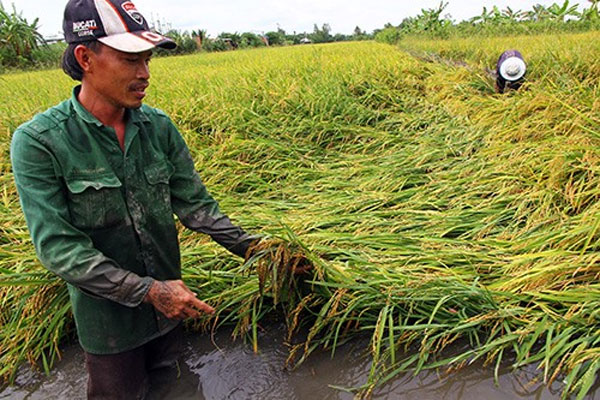VietNamNet Bridge – Abnormal weather late last year and earlier this year has caused losses for farmers in southern provinces of Dong Nai and Binh Phuoc, reported the Vietnam News Agency.

|
|
Abnormal weather late last year and earlier this year has caused losses for farmers in southern provinces of Dong Nai and Binh Phuoc, reported the Vietnam News Agency. — Photo vnexpress.net |
In Dong Nai Province, many kinds of perennial and fruit trees died due to prolonged and heavy rains during the dry season. Productivity has just reached 30 per cent as compared to last year’s crops.
Nguyen Thi Kim Mai, a farmer in Phu Ngoc Commune in Dinh Quan District, said “the mango trees could not be fruit-bearing because the unseasonal rains made fungus attack the flowers”.
Mai’s family is growing 14ha of mangos and 10 ha of cashews. In previous years, her family harvested about 200 tonnes of mangoes, which brought a profit of hundreds of million of dong per year along with VND500 million profit from cashews.
However, since late last year, the abnormal weather has caused her family’s mangoes and cashews yields to dramatically decrease.
Pepper growers have also suffered similar losses, with hundreds of hectares of pepper destroyed and many households pushed to bankruptcy.
Tran Van Hoanh, a pepper grower in Song Ray Commune of Cam My District, said his family has 10,000sq.m of pepper that usually yields 5 tonnes and a profit of VND600 million annually.
But since earlier this year, the unseasonal heavy rains destroyed 70 per cent of the total trees.
“Many working hours of my family members and money lent from banks ware washed away”, he said.
According to the farmer, pepper was considered a “gold” tree, but it needed a big investment.
Growing one hectare of pepper cost VND600-800 million. The tree just bears the beans after 4 years, said Hoanh.
“My family would lend more from banks for re-growing. But I was not sure about the weather”, he said.
“The weather was developing unusually, and I was worried about diseases to the trees. And the farmers could not deal by themselves”, he said.
According to Dong Nai Province’s Cultivation and Plant Protection Department, the province has about 11,500ha of mangoes, 40,000ha of cashews, 14,300 ha of peppers, and 11,000ha of rambutans.
Tran Lam Sinh, the department’s head, said local government has set up working teams to inspect the situation and draw out measures to help farmers prevent diseases from spreading.
The recent abnormal weather has damaged dozens of hectares of mangoes and rambutans and destroyed hectares of peppers.
Pepper and cashew growers in Binh Phuoc Province have suffered the same situation, due to the impacts of climate change.
Binh Phuoc Province is considered Viet Nam’s cashew kingdom. The farmers earned big profits last year, when the yield reached 202,000 tonnes on total area of 149,000ha and the price was at peak as compared previous years, reported the provincial Agriculture and Rural Development.
However, this year will be hard.
“The unseasonal rains destroyed cashew flowers, so this year the yield will definitely reduce by 50 per cent”, Nguyen Van Chien from Bu Gia Map District told Dau Tu (Investment) Review.
“The weather this year was so strange. I had never ever seen heavy rains in February. The rain destroyed all my flower-bearing trees”, said Nguyen Van Tu in Dong Phu District.
Scarce for export demand
The unusual weather has not only caused losses for farmers but also for exporting businesses.
The big concern for pepper and cashew exporting businesses is lack of products to fulfill contracts signed this year.
According to Tran Hoang Son, director of Gia Bao Cashew Company, the cashew price will increase to VND50,000 from VND45,000 per kg due to crop losses.
“The increase of price is not the only concern. The product scarcity is really a headache for the business”, Son said.
We were afraid we’d lack products to fulfill the contracts this year, he said.
Hua Thi Lien, director of Viet Pepper Company based in HCM City, expressed her worries about foreseen losses of pepper crops.
Our companies signed big contracts with partners in India, Canada, and China, she said.
The company will definitely suffer losses due to price hikes and lack of products for export, Lien said.
| related news |
VNS